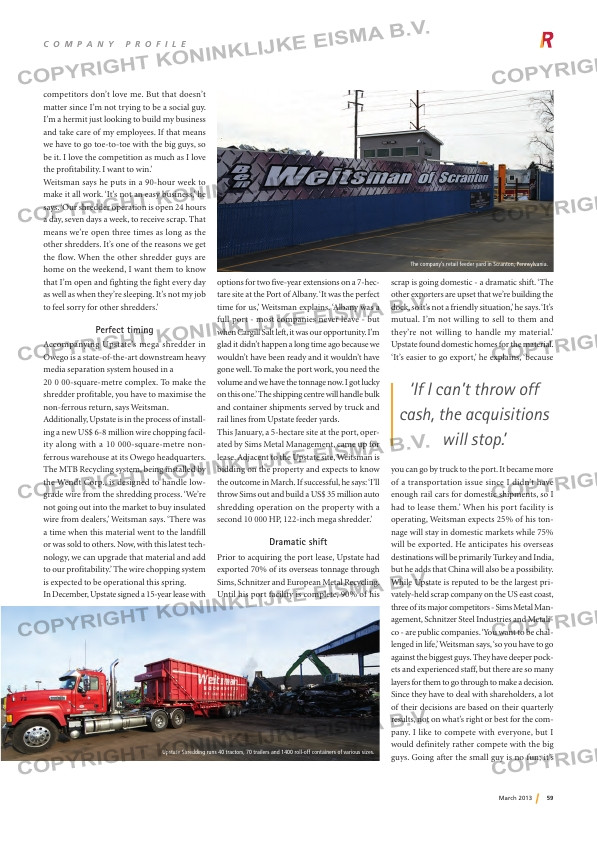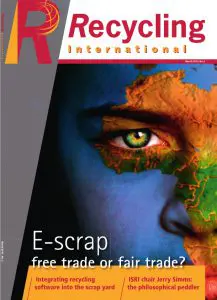Page 59 from: March 2013

59March 2013
competitors don’t love me. But that doesn’t
matter since I’m not trying to be a social guy.
I’m a hermit just looking to build my business
and take care of my employees. If that means
we have to go toe-to-toe with the big guys, so
be it. I love the competition as much as I love
the profitability. I want to win.’
Weitsman says he puts in a 90-hour week to
make it all work. ‘It’s not an easy business,’ he
says. ‘Our shredder operation is open 24 hours
a day, seven days a week, to receive scrap. That
means we’re open three times as long as the
other shredders. It’s one of the reasons we get
the flow. When the other shredder guys are
home on the weekend, I want them to know
that I’m open and fighting the fight every day
as well as when they’re sleeping. It’s not my job
to feel sorry for other shredders.’
Perfect timing
Accompanying Upstate’s mega shredder in
Owego is a state-of-the-art downstream heavy
media separation system housed in a
20 0 00-square-metre complex. To make the
shredder profitable, you have to maximise the
non-ferrous return, says Weitsman.
Additionally, Upstate is in the process of install-
ing a new US$ 6-8 million wire chopping facil-
ity along with a 10 000-square-metre non-
ferrous warehouse at its Owego headquarters.
The MTB Recycling system, being installed by
the Wendt Corp., is designed to handle low-
grade wire from the shredding process. ‘We’re
not going out into the market to buy insulated
wire from dealers,’ Weitsman says. ‘There was
a time when this material went to the landfill
or was sold to others. Now, with this latest tech-
nology, we can upgrade that material and add
to our profitability.’ The wire chopping system
is expected to be operational this spring.
In December, Upstate signed a 15-year lease with
options for two five-year extensions on a 7-hec-
tare site at the Port of Albany. ‘It was the perfect
time for us,’ Weitsman explains. ‘Albany was a
full port – most companies never leave – but
when Cargill Salt left, it was our opportunity. I’m
glad it didn’t happen a long time ago because we
wouldn’t have been ready and it wouldn’t have
gone well. To make the port work, you need the
volume and we have the tonnage now. I got lucky
on this one.’ The shipping centre will handle bulk
and container shipments served by truck and
rail lines from Upstate feeder yards.
This January, a 5-hectare site at the port, oper-
ated by Sims Metal Management, came up for
lease. Adjacent to the Upstate site, Weitsman is
bidding on the property and expects to know
the outcome in March. If successful, he says: ‘I’ll
throw Sims out and build a US$ 35 million auto
shredding operation on the property with a
second 10 000 HP, 122-inch mega shredder.’
Dramatic shift
Prior to acquiring the port lease, Upstate had
exported 70% of its overseas tonnage through
Sims, Schnitzer and European Metal Recycling.
Until his port facility is complete, 90% of his
C o m p a n y p r o f i l e
scrap is going domestic – a dramatic shift. ‘The
other exporters are upset that we’re building the
dock, so it’s not a friendly situation,’ he says. ‘It’s
mutual. I’m not willing to sell to them and
they’re not willing to handle my material.’
Upstate found domestic homes for the material.
‘It’s easier to go export,’ he explains, ‘because
you can go by truck to the port. It became more
of a transportation issue since I didn’t have
enough rail cars for domestic shipments, so I
had to lease them.’ When his port facility is
operating, Weitsman expects 25% of his ton-
nage will stay in domestic markets while 75%
will be exported. He anticipates his overseas
destinations will be primarily Turkey and India,
but he adds that China will also be a possibility.
While Upstate is reputed to be the largest pri-
vately-held scrap company on the US east coast,
three of its major competitors – Sims Metal Man-
agement, Schnitzer Steel Industries and Metali-
co – are public companies. ‘You want to be chal-
lenged in life,’ Weitsman says, ‘so you have to go
against the biggest guys. They have deeper pock-
ets and experienced staff, but there are so many
layers for them to go through to make a decision.
Since they have to deal with shareholders, a lot
of their decisions are based on their quarterly
results, not on what’s right or best for the com-
pany. I like to compete with everyone, but I
would definitely rather compete with the big
guys. Going after the small guy is no fun; it’s
‘If I can’t throw off
cash, the acquisitions
will stop.’
The company’s retail feeder yard in Scranton, Pennsylvania.
Upstate Shredding runs 40 tractors, 70 trailers and 1400 roll-off containers of various sizes.
RI_2-CompProfile.indd 59 06-03-13 09:28



